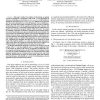Free Online Productivity Tools
i2Speak
i2Symbol
i2OCR
iTex2Img
iWeb2Print
iWeb2Shot
i2Type
iPdf2Split
iPdf2Merge
i2Bopomofo
i2Arabic
i2Style
i2Image
i2PDF
iLatex2Rtf
Sci2ools
ICCAD
1999
IEEE
1999
IEEE
Clock skew scheduling for improved reliability via quadratic programming
This paper considers the problem of determining an optimal clock skew schedule for a synchronous VLSI circuit. A novel formulation of clock skew scheduling as a constrained quadratic programming (QP) problem is introduced. The concept of a permissible range, or a valid interval, for the clock skew of each local data path is key to this QP approach. From a reliability perspective, the ideal clock schedule corresponds to each clock skew within the circuit being at the center of the respective permissible range. However, this ideal clock schedule is not practically implementable because of limitations imposed by the connectivity among the registers within the circuit. To evaluate the reliability, a quadratic cost function is introduced as the Euclidean distance between the ideal schedule and a given practically feasible clock schedule. This cost function is the minimization objective of the described algorithms for the solution of the previously mentioned quadratic program. Furthermore, t...
Clock | Clock Schedule | Clock Skew | Hardware | ICCAD 1999 |
| Added | 03 Aug 2010 |
| Updated | 03 Aug 2010 |
| Type | Conference |
| Year | 1999 |
| Where | ICCAD |
| Authors | Ivan S. Kourtev, Eby G. Friedman |
Comments (0)

